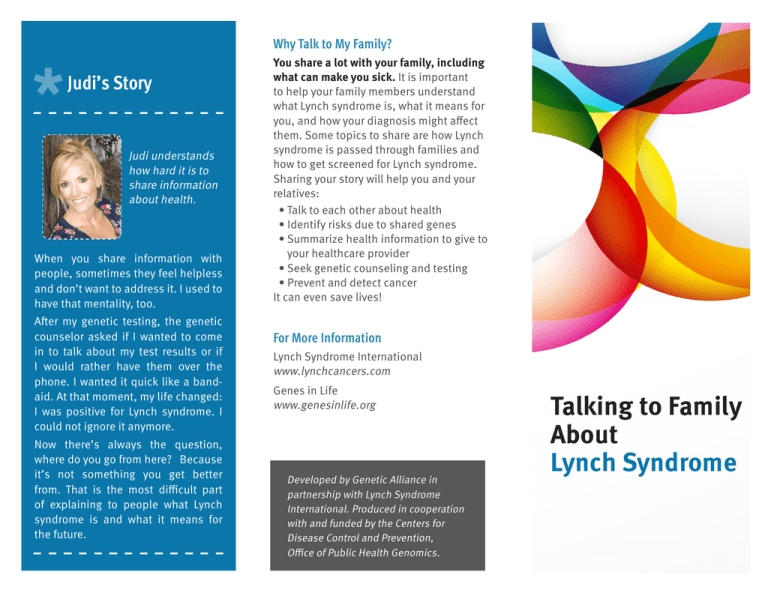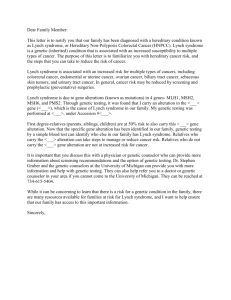* Judi’s Story Why Talk to My Family?
advertisement

* Why Talk to My Family? Judi’s Story Judi understands how hard it is to share information about health. When you share information with people, sometimes they feel helpless and don’t want to address it. I used to have that mentality, too. After my genetic testing, the genetic counselor asked if I wanted to come in to talk about my test results or if I would rather have them over the phone. I wanted it quick like a bandaid. At that moment, my life changed: I was positive for Lynch syndrome. I could not ignore it anymore. Now there’s always the question, where do you go from here? Because it’s not something you get better from. That is the most difficult part of explaining to people what Lynch syndrome is and what it means for the future. You share a lot with your family, including what can make you sick. It is important to help your family members understand what Lynch syndrome is, what it means for you, and how your diagnosis might affect them. Some topics to share are how Lynch syndrome is passed through families and how to get screened for Lynch syndrome. Sharing your story will help you and your relatives: • Talk to each other about health • Identify risks due to shared genes • Summarize health information to give to your healthcare provider • Seek genetic counseling and testing • Prevent and detect cancer It can even save lives! For More Information Lynch Syndrome International www.lynchcancers.com Genes in Life www.genesinlife.org Developed by Genetic Alliance in partnership with Lynch Syndrome International. Produced in cooperation with and funded by the Centers for Disease Control and Prevention, Office of Public Health Genomics. Talking to Family About Lynch Syndrome IT IS NOT EASY... ...but talking about Lynch syndrome is one of the most important things you can do to protect your family. How Do I Talk to My Family? Know the facts Lynch syndrome is complicated! Know the facts so you can answer questions your family members have or refer them to other sources of good information. For each family member you talk to, understand what your diagnosis might mean for him or her. For example, some family members may have a higher chance of having Lynch syndrome. Use your own experiences and knowledge from your healthcare providers and others. If you feel you need extra support while talking to your family, bring a friend or health professional along with you. Use what you have Test results, letters from your doctor and/ or genetic counselor, or other information you received about your diagnosis can be shared with family to help them understand your situation. Just as each family is unique, so is the mutation in the family. Knowing your specific mutation helps healthcare providers know exactly what to test and saves your family money. Plan an individual conversation Some people respond better to one-onone talks rather than conversations in a large group. This will give you the chance to answer any questions they have and ask questions of your own. Sometimes healthcare providers ask for test results or other records from family members. If you have other relatives with cancer, get as much information as you can to avoid repeat or extended visits. Send a letter or email Some people like to get information in writing so they can process it on their own first. Your healthcare provider or genetic counselor may be able to help you write a letter and figure out who in the family would benefit from being informed. How Do I Talk to My Children? If you have Lynch syndrome, you will need to explain the condition to your children. Just as you need time to cope with the information and accept it, so will your children. If they are young, it might be difficult for them to understand the implications of the diagnosis. Answer the questions they ask. They will ask more complex questions as they grow and are ready to learn more. Most healthcare providers will not offer genetic testing to people who are under 18. As your children get older, talk to them about whether and when they want to be tested. What If My Family Does Not Want to Talk? Some family members might not understand why it is important to know this information. Others might be nervous about receiving a diagnosis of Lynch syndrome themselves. Make it clear that although there is no way to get rid of your risk for Lynch syndrome, there is a chance that they will never experience cancer. Regular screenings can detect cancer early so you can treat or remove it before it becomes life-threatening. They can still lead happy, healthy lives with careers, hobbies, and families. If family members still do not want to talk about it, respect their wishes. Let them know you are available to talk if they have questions, and give them some places to find information for when they are ready to learn more. When family members do not want to talk about Lynch syndrome, you might feel upset or alone. Seek support from friends, healthcare providers, other family members, or people you know with Lynch syndrome. There is no one-size-fits-all family! TALKING TO FAMILY ABOUT LYNCH SYNDROME
